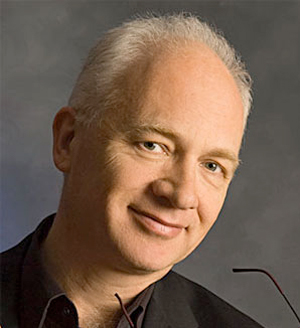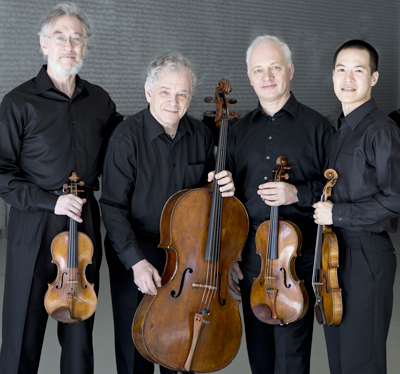by Daniel Hathaway

British-born violist Roger Tapping joined the Juilliard two seasons ago after playing for a decade with the Takács Quartet. We reached him by Skype at his home northeast of Boston to chat about the quartet’s recent activities and the program it has planned for Cleveland next week.
Daniel Hathaway: How did you enjoy your time in Spain?
Roger Tapping: It was lovely, thanks. Unusually for a trip like this, three concerts were in Bilbao and the rest were within driving distance, so we had a whole week in the same hotel. We got to explore the city somewhat and we all went separately to the Guggenheim Museum. I even got to their great restaurant, which is an experience in itself.
DH: I see you played Martinů’s Concerto for String Quartet and Orchestra several times. That isn’t exactly standard repertory.
RT: Yes, we played the Martinů with the Basel Chamber Orchestra in Basel and Dijon, and then with the Bilbao Symphony Orchestra in Bilbao and Santander. We learned it especially for these concerts and we were glad to have the chance to do it five times. We didn’t know whether we were going to like it, but someone suggested it and we ended up really enjoying it. It’s a strange piece. The quartet alternates with the orchestra and the texture is dense but very lively. We’d like to do it again in the future.
DH: How did audiences react to the piece?
RT: Very well. The Spanish audiences seemed enthusiastic, but the audiences in Basel were even more so. Martinů is not at the top of people’s favorites, but Basel has a longstanding Martinů festival. One of his symphonies was also on the program, so they were not just randomly hearing Martinů amongst Beethoven and Schubert.
DH: How do the Juilliard go about programming repertoire for a whole season?
RT: At a certain time in the year, around the middle of the spring, it occurs to us that we have to decide what we’re going to do two seasons later. The Juilliard have a long history and great tradition of making programs that are quite challenging and interesting with a strong strand of contemporary music, or at least music that has that flavor. This season we’re programming Berg’s Quartet, op. 3 and Webern’s Five Movements. Of course they were written a hundred years ago, but they still have the label. We start with that idea as part of each of our programs — to play something from the Second Viennese School onwards, and usually works that have the flavor of something new and often American.
Last year we did Schubert’s great G-major quartet and we really had a good time with that, so this year we said, let’s do “Death and the Maiden.” Last year we did the Berg Lyric Suite, and I’d never played the op. 3 quartet, so I asked, can we do that please? And they said, yes, sure.
Then we like to continue a conversation we’ve started in the previous season. Just before I joined the Juilliard Quartet, they recorded Elliott Carter’s fifth quartet to make a boxed set. The quartet has worked with Carter and championed all his works, so we decided that next season we’ll take on his first quartet. There’s a long-term narrative logic to our programming, but it also reflects what we like to play. If somebody doesn’t like something, we don’t do it.
This season, we’ve been programming a newish “American” quartet by Shulamit Ran, an Israeli who is living in the US. A colleague coached it at a festival, and my wife, Natasha Brofsky, has played some of her music.
DH: In Cleveland, you’ll be playing Webern, Haydn and Schubert.
RT: We love the Webern Five Movements, and yet you never quite know how much audiences are going to feel engaged by it. He’s famous for writing these little jewels with lots of polished facets and tiny detail. He conjures worlds of color in eight minutes. We’re so delighted how audiences have enjoyed it. We find ourselves onstage completely wrapped up in the music, some of which is suddenly very dramatic, some of which makes strange, nostalgic references to waltzes, and all underneath the surface. This is music you’re never going to get bored with or allow to sound hackneyed. And leading off with Webern has worked better than we thought. It immediately draws people in. They have to listen in a concentrated way.
Then we were talking and someone said, hey, we should play some Haydn — maybe not late Haydn but mature, early Haydn to balance the Schubert. How did we choose it? We find ourselves reading pieces with students at festivals, and I think I suggested this one. You can’t really go wrong. There are so many Haydn quartets that are intriguing to play and to listen to. The G-major Quartet [op. 33, no. 5] has the most beautiful slow movement that’s like an operatic aria.
DH: And then, “Death and the Maiden.”
RT: That has a special place in my heart. When I was about ten, my father suggested that I use what we called a record token in my country to buy “Death and the Maiden.” I fell instantly in love with it and wore out the record. I didn’t realize until about eight years later that it was really quite difficult to play. We all absolutely love it, and we’re going to be making a high-end iPad app in December, sort of a video recording of the piece. With the really great pieces, you continue to find connections. You can fall in love with it at the age of ten, and then there’s the greater knowledge of how it’s made, which comes to you more like when you’re fifty-four. The Schubert has an intriguing structure. You can find the opening material baked into the whole thing. Schubert is thought of as a lyrical composer, but he really knew what he was doing in his control of motivic writing. It’s very sophisticated, and the variations are fantastic.
DH: Did you start out playing viola?
RT: I started on the violin, but I took a detour when I was twelve and started to play viola in quartets, but still played violin for my lessons. I finally dropped the violin when I was seventeen, and I’ve never regretted it for a single moment.
DH: Even in moments like the recent Air Canada carry-on baggage kerfuffle?
RT: I think they were just being ignorant, and the airline was ridiculed to such an extent that it took only a very few days to change their minds.
DH: When you get the viola community riled up, things happen fast!
RT: You never know your power! Now I try to get on a plane early out before everybody’s put their rollers on. I try to get a seat in the back near a window so I’ll be in the first lot to get on, and that always works.
DH: Speaking of travel, you’re based in the Boston area while your other three colleagues live in New York.
RT: This is a temporary thing because I still have kids in school and my wife and I have students at the New England Conservatory. We will be making the move to New York, but in this transitional period I know the inside of the Amtrak Acela train very well. We rehearse a lot each week and I spend a couple of nights in New York.
DH: I hear by the grapevine that your daughter, a jazz vocalist, is applying to the Oberlin Conservatory.
RT: We have our fingers crossed. She loved it there!
Published on ClevelandClassical.com November 29, 2014.
Click here for a printable copy of this article




